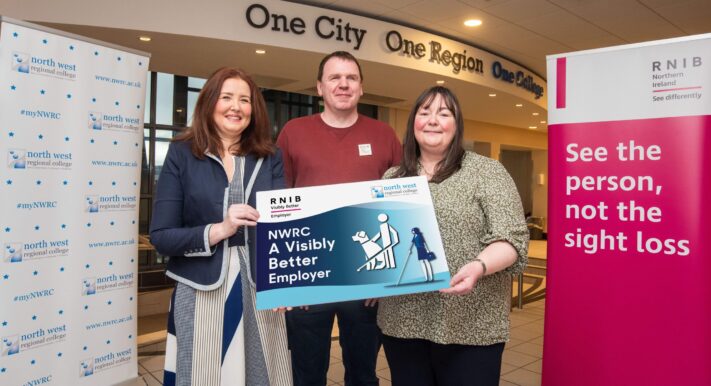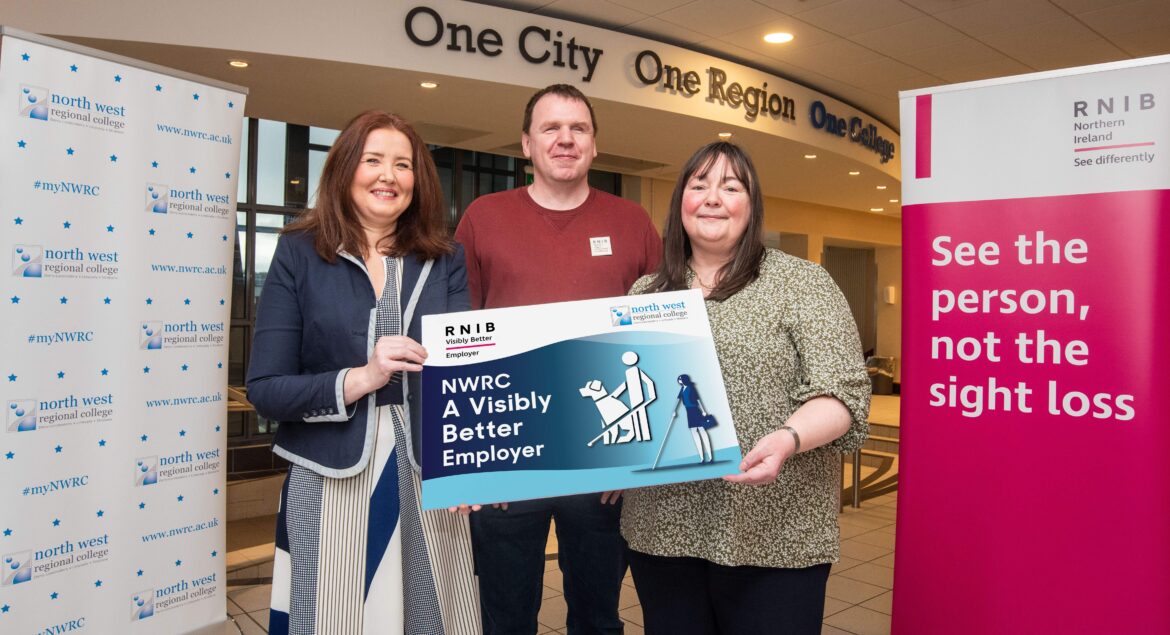
From left Wendy Herbison RNIB Joe Kenny RNIB Fiona Hamilton NWRC celebrate the Colleges new award
The College was presented with the standard in recognition of their commitment to workplace inclusion and diversity.
The award comes just one year after the passing of a council motion to make Derry City and Strabane District a ‘Visually Aware Space.’
Fiona Hamilton, Compliance and Equality Officer with NWRC, said: “The College is delighted to be the first College in Northern Ireland to achieve the award, especially because improvements made will positively impact organisations across the sector.
“We have worked closely with RNIB for many years in partnership with Martin O’Kane and Wendy Herbison at the charity and Paul Donnelly at Hallmark to achieve this standard.
“Our recruitment processes already took cognisance that reasonable adjustments for some applicants/candidates may be necessary during the recruitment process.
“The process was further updated to include the development of templates for job descriptions and personnel specifications, which are all compliant with the RNIB Visibly Better Employer standard and available for any blind or partially sighted applicant that requires documents in an alternative format.
“RNIB sight loss awareness training was also included at staff inductions as well as advertisements placed in various disability centred groups such as Employers for Disability NI, NIUSE and the CEDAR foundation.”
RNIB’s Employment Services Manager in Northern Ireland, Wendy Herbison, said: “We are delighted that the North West Regional College has been recognised as a Visibly Better Employer.
“We have enjoyed working closely with the team at NWRC and particularly with Fiona Hamilton, Compliance/Equality Training Support, over the past number of years and I’m delighted that we are here to celebrate this achievement.
“I’m keen to share the message with NI employers that RNIB has specialists who can help organisations implement practices which enables them to become an inclusive employer for anyone with sight loss and NWRC has actively embraced this.
“The employment rate of blind and partially sighted people is unacceptably low.
“This is mainly due to misconceptions and poor knowledge preventing employers from seeing blind and partially sighted people as potential employees.
“The Visibly Better Employer scheme aims to show the value that a diverse workforce offers, and that blind and partially sighted people capable of a variety of different roles in varying industries by promoting real-life experiences.
“I would appeal to other employers across NI to contact us and explore our Visibly Better Employer quality standard.
“At RNIB, we are ready to support them on that journey.”
Sight loss charity RNIB NI offers employers, from any sector, the opportunity to work collaboratively to become a more inclusive employer of people with sight loss, through aligning their recruitment and working practices to the RNIB Visibly Better Employer quality standard.
It is a shocking statistic that only 27 percent of those with sight loss of working age are in paid employment.
This is a figure that has remained stubbornly high in recent years.
Through the Visibly Better Employer scheme, RNIB has already supported a wide range of UK employers across different sectors including banking, civil service, marketing, education, third sector, legal, retail and customer service. As a result, organisations have increased their employee diversity by attracting and retaining more blind and partially sighted talent into their workforce.
There is no cost for this quality standard – RNIB offers recommendations for improvements in employer practice and then supports the organisation to implement them.
RNIB wants employers and organisations to ‘see the employee, not the sight loss’, to ensure people with disabilities, including employees or applicants with sight loss, are included in a truly diverse and inclusive workforce throughout Northern Ireland and across the UK.
In November 2022 RNIB launched the ‘Eye Work With You Too’ research report. It revealed that a lack of awareness and understanding of sight loss or out-dated attitudes towards employing someone with sight loss, are the biggest barriers blind or partially sighted people face to getting a job. This is due largely to:
Misconceptions about what someone with sight loss can and can’t do
Inaccessible recruitment practices and processes
Inadequate employee support
To find out more and start your journey to becoming a Visibly Better Employer, visit RNIB’s website at: www.rnib.org.uk/employment
Tags:





